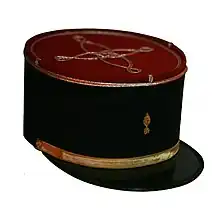képi
See also: kepi
English
Noun
képi (plural képis)
- Alternative spelling of kepi.
- 1872, J[ames] L[umsden] Seton, Notes on the Operations of the North German Troops in Lorraine and Picardy; Taken While Accompanying Principally the 40th, or Hohenzollern Fusilier Regiment, London: W. Mitchell and Co., […], page 218:
- My craning round long enough only to see that the unknown wore képis, brought another volley, harmless, but that it made my unruly made my unruly mount so fidgety that the saddle twisted round, and I came to the ground.
- 1886 April, The Carthusian, volume IV, number 123, page 173, column 2:
- Both companies were provided with helmets instead of the second company wearing képis as is usually the case.
- 1903, John Oxenham, Flowers of the Dust, page 331:
- Madame here says we might get our heads cracked if we wore képis. They’re not the fashion here.
- 1910, Théodore Duret, translated by John Ernest Crawford Flitch, Manet and the French Impressionists, page 225:
- The second, at which all the men at the execution are soldiers, wearing képis, has been cut in pieces, nearly all of which have been collected and put together.
- 1955, Ward Moore, Bring the Jubilee, William Heinemann Ltd, page 181:
- I guessed him Northern from his képi, but this was not conclusive, for many Southron regiments wore képis also.
- 1975, Nicolas Freeling, What are the Bugles Blowing For?, Heinemann, →ISBN, page 6:
- In Memphis he supposed there’d be more blacks, and here the cops wore képis so you were in France, but in the long run it was all McKeesport, Pennsylvania, and the smell would be just the same.
- 1981, Peter Abrahams, The Fury of Rachel Monette, London: Frederick Muller Limited, →ISBN, page 305:
- They wore képis, the flat, round-topped, stiff-brimmed hat of the French soldier.
- 1994, Hubert C. Johnson, Breakthrough!: Tactics, Technology, and the Search for Victory on the Western Front in World War I, Presidio, →ISBN, page 41:
- The soldiers wore képis with bright gold braid; their uniforms were blue.
- 1996, Caribbean (Frommer’s), →ISBN, page 480:
- It has a distinctly French air. Policemen, for example wear képis.
- 2010, Martin Windrow, Our Friends Beneath the Sands: The Foreign Legion in France’s Colonial Conquests 1870–1935, Orion Books, →ISBN:
- They wore képis with long couvre-nuque sun-curtains, abandoned by Legion infantry since the First World War; […]
- 2014, Michel Déon, translated by Julian Evans, The Foundling’s War, Gallic Books, →ISBN:
- Through the windows passengers glimpsed the blue uniforms of French gendarmes, policemen wearing képis at a rakish angle, even a squad of soldiers in khaki on their way to relieve their comrades.
French
Pronunciation
- IPA(key): /ke.pi/
Audio (file)
Noun
képi m (plural képis)
- kepi (cap with a flat circular top)
- 1924, Emmanuel Bove, Mes Amis:
- On descend à chaque instant du trottoir, à cause de la foule. Au milieu de la rue se trouve un commissariat, avec des agents sans képi et des bicyclettes à la porte.
- (please add an English translation of this quotation)
Descendants
Etymology 2
Verlan form of piquer.
Further reading
- “képi”, in Trésor de la langue française informatisé [Digitized Treasury of the French Language], 2012.
 képi on the French Wikipedia.Wikipedia fr
képi on the French Wikipedia.Wikipedia fr
Hungarian
Pronunciation
- IPA(key): [ˈkeːpi]
- Hyphenation: ké‧pi
- Rhymes: -pi
Declension
| Inflection (stem in -e-, front unrounded harmony) | ||
|---|---|---|
| singular | plural | |
| nominative | képi | képiek |
| accusative | képit | képieket |
| dative | képinek | képieknek |
| instrumental | képivel | képiekkel |
| causal-final | képiért | képiekért |
| translative | képivé | képiekké |
| terminative | képiig | képiekig |
| essive-formal | képiként | képiekként |
| essive-modal | — | — |
| inessive | képiben | képiekben |
| superessive | képin | képieken |
| adessive | képinél | képieknél |
| illative | képibe | képiekbe |
| sublative | képire | képiekre |
| allative | képihez | képiekhez |
| elative | képiből | képiekből |
| delative | képiről | képiekről |
| ablative | képitől | képiektől |
| non-attributive possessive - singular |
képié | képieké |
| non-attributive possessive - plural |
képiéi | képiekéi |
This article is issued from Wiktionary. The text is licensed under Creative Commons - Attribution - Sharealike. Additional terms may apply for the media files.
